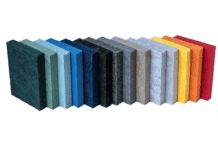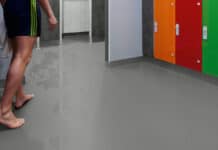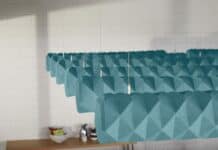Noise is a serious issue in correctional institutions due to its direct impact on inmate health, as well as facility safety and security. But, the necessary hard finishes of prison walls and ceilings create perfect conditions for a storm of reverberation and excessive noise. It’s a common problem in such high security settings.
In the case of the new Mule Creek Infill Complex (MCIC) in Ione, CA — a California Department of Corrections and Rehabilitation (CDCR) project comprising 544,000 square feet of new construction spread across 23 buildings — acoustics are an even bigger issue. The dormitory-style prison is intended to focus on rehabilitation and the needs of Level II inmates with disabilities and intermediate medical or mental health issues. Eager to find the soundest acoustic solution for this particular challenge, the lead design/build firm, Hensel Phelps Construction, turned to Eckel Noise Control Technologies (Eckel) in Cambridge, MA.
Wendy Andreotti, Hensel Phelps design manager on the MCIC project, knew they had to meet strict American Correctional Association (ACA) standards for acoustics in the housing dayrooms. The ACA’s Performance-Based Standards for Adult Local Detention Facilities specifies that “the unoccupied mid-frequency average reverberation time, RT60, must be less than 1.0 sec.” Andreotti’s search for a solution led her to Eckel and its Eckoustic Correctional Panels (ECPs).

“Eckel’s detention-rated Correctional Panels were the perfect remedy. We were impressed with the panels’ high-performance noise control characteristics and simple installation process, while CDCR likes their durability and low maintenance,” Andreotti said.
Eckel ECPs are perforated metal acoustic panels comprising 2″ thick, flat, sound-absorbing material and a security fastening system. They are designed specifically to reduce noise in correctional institutions, jails, detention centers, and other high security facilities.
Hensel Phelps installed a total of 1,008 Eckel panels in the six MCIC housing buildings, each of which contains four wings of housing dayrooms and dorm rooms. In each wing, a combination of 42 panels sized 10′ x 18″ and 8′ x 18″ were mounted on the walls.
“We’re all very pleased with the noise-reduction results of the Eckel panels,” said Andreotti. “When Shen, Milsom & Wilke — the acoustic consultant on the project — ran pre-construction computer model acoustic tests for MCIC’s housing dayrooms and dorm rooms, the calculated reverb time was 1.15 seconds. After installation of the Eckel panels, the field-tested reverb time was 0.97, surpassing the ACA standard.”
Dining Hall Acoustics
Initially, no panels were specified for MCIC’s dining halls (housed in separate buildings of the Complex). While ACA doesn’t have an acoustic standard for dining halls, a “best practices” average reverb time of 0.8 seconds was established for the project. Shen, Milsom & Wilke’s acoustic testing in the two main dining halls revealed a reverb time of 2.92 seconds, well beyond that threshold. Knowing the success already achieved in the housing buildings, Hensel Phelps and CDCR turned to Eckel to resolve the issue.
This round of installation requires mounting the panels around existing fixtures, electrical components and the like. In each hall, a combination of 178 ECPs sized 8′ x 18″, 6′ x 18″ and 4′ x 18″ are being affixed to the walls. Installation is expected to be completed within a month, and Andreotti is confident the ECPs will bring the reverb time under control.
The first inmates were moved into MCIC on February 22, 2016. The dedication ceremony took place on April 19, 2016.



















![[VIDEO] Collect Asset Data at the Speed of Walking a Building](https://facilityexecutive.com/wp-content/uploads/2024/02/maxresdefault-324x160.jpg)